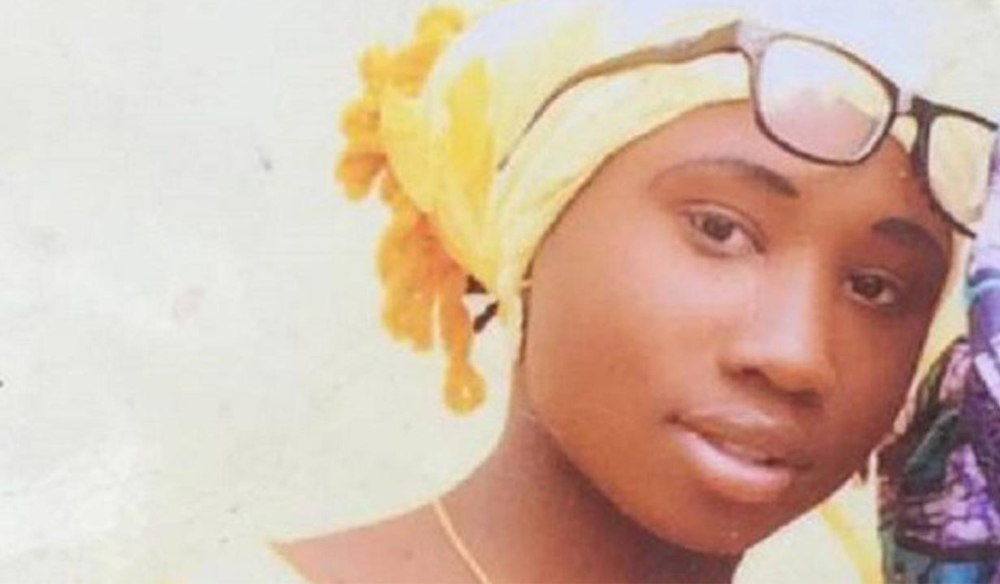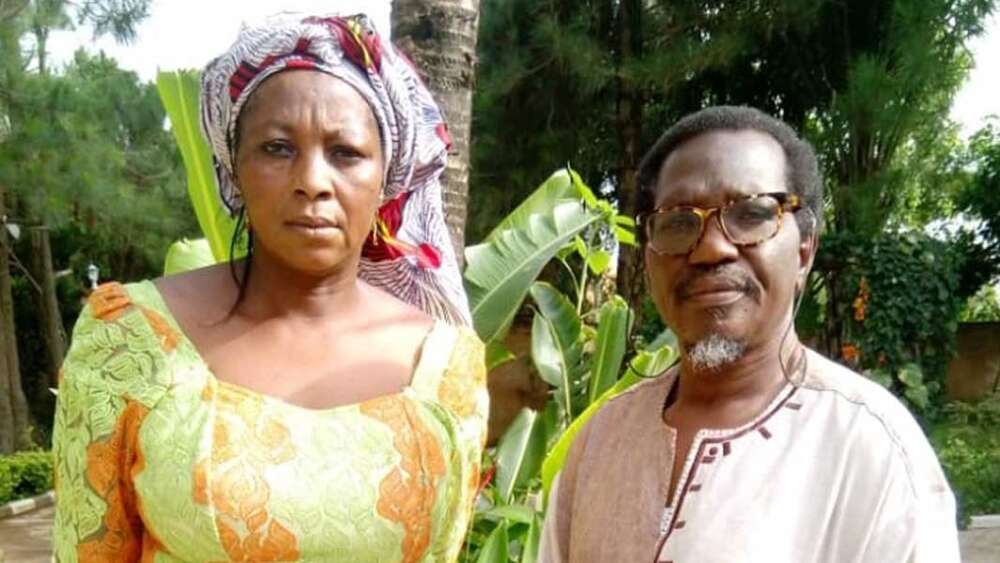'God's in control' says mum of kidnapped Nigerian schoolgirl
Her daughter, Leah Sharibu, turns 18, after 3 years of captivity to Boko Haram faction
Over three years ago, Leah Sharibu was one of more than 100 schoolgirls kidnapped from her school in Nigeria. Last week, Leah’s family were forced to mark another milestone with her – May 14, the date of her 18th birthday. Yet her mother says she is still holding on to the hope in God that Leah will be released.
“Do you have hope that you will see Leah again?” reporter Tobi Aworinde of Punch newspaper in Nigeria asked Leah’s mother, Rebecca Sharibu, ahead of Leah’s birthday earlier this month.
“Yes, by the grace of God. I have not lost hope because God is in control and people are praying. I have the hope that one day, I will see my daughter again,” Rebecca replied.
On February 19, 2018, the Boko Haram faction Islamic State West Africa Province (ISWAP – also known as ISIS-WA) attacked Nigeria’s Government Girls Science and Technical School in Dapchi, Yobe State. ISWAP abducted 110 girls, five of whom were reported killed in the abduction.
Just a few weeks later on March 2018, 104 girls of the girls – all those abuducted who were still alive except Leah Sharibu – were returned to their families. ISWAP reportedly kept Leah Sharibu because she refused to comply with their demands and convert from her Christian faith to Islam.
In August 2018, ISWAP released a photograph of Leah wearing a hijab and an audio recording as “proof of life” in their negotiations with the Nigerian Government.
“I am Leah Sharibu, the girl that was abducted in GGSS Dapchi. I am calling on the government and people of goodwill to intervene to get me out of my current situation,” Leah said in the recording.
“I also plead to the members of the public to help my mother, my father, my younger brother and relatives. Kindly help me out of my predicament. I am begging you to treat me with compassion, I am calling on the government, particularly, the president to pity me and get me out of this serious situation. Thank you.”
Then, in October 2018 ISWAP released a video in which they executed of Saifura Khosa, a midwife with the International Committee of the Red Cross. In it, Leah’s captors declared she and Christian nurse Alice Loksha Ngaddah – another hostage who had been abducted on 1 March 2018 – would be enslaved for life, and that it was now “lawful” for the terrorists to “do whatever we want with them.”
“Why have they not yet released my daughter? … She only refused to renounce her Christian faith” – Rebecca Sharibu
But on January 15 2020, the release of Jennifer Ukambong Samuel, who works for Action for International Medical Alliance and who was abducted by on 22 December 2019 by ISWAP brought good news for the Sharibu family.
“The freed nurse, who said she went to Ngaddah’s house in the forest, insisted that Leah and Ngaddah are not dead. According to her, Ngaddah informed them Leah is fatter now than when she was newly abducted. She also added that Leah Sharibu has her own house around Lake Chad,” reported Ripples Nigeria.
For her part, Leah’s mother Rebecca remains stoic when questioned about things such as Leah wearing a hijab in releases by her captors and reports that she has given birth to two children.
“I’ve only seen the video; I’ve not seen my daughter. I don’t know what was happening there,” Rebecca told Punch.
“All the things they are saying, whether that she is dead or that she is pregnant or has given birth to a second baby, as far as I am concerned, they are all rumours. I have not seen my daughter. I just want to see her. When I see my daughter, then I can confirm anything. But for now, I haven’t heard anything from my daughter and I don’t know where she is.”
Rebecca is less patient when discussing the Nigerian Government’s failure to secure her daughter’s release.
“When my daughter was taken away in February 2018, I did not hear from the government; I did not hear from anybody until seven months after. It was then that a video was released of her in a hijab. Boko Haram had released a video to say they had killed one health worker and they said the next person to be killed would be Leah. So, the Leah Foundation organised a world press conference in Jos,” she explains.
“We asked the world for help because the next person Boko Haram said they would kill was my daughter. We said we had not heard from the government or anybody as a family and that, as far as we were concerned, we were calling on the international community to plead with the Nigerian government to take action.”
It was not until the night of the press conference, Rebecca says, that the President called and spoke with her for the first time.
“After speaking to me, he (President) promised that he would do everything possible to bring Leah back,” she says. “Two weeks after, he sent three ministers led by the Minister of Information, Lai Mohammed, to us … with a very large delegation and the media to say that very soon, Leah would be found … They took pictures and it was all over the media that the President sent ministers.”
Since then, the family has had a visit from Paulen Tallen, Minister of Women Affairs in October 2020 with another message “that the President was still working towards fulfilling the promise that he would rescue Leah”. Since then, there has been no contact or communication.
Rebecca says she thinks the reason the Nigerian Government has failed to secure Leah’s release is her Christian faith.
“All the other girls that were taken were Muslims and they were all released. But my daughter is still in captivity, I believe, because of her faith. If not, why have they not yet released my daughter? What crime has she committed? She only refused to renounce her Christian faith,” she says.

Leah Sharibu Boko Haram
Jo Newhouse, spokesperson for Open Doors in sub-Saharan Africa is slightly more circumspect, acknowledging that the government’s “silence might come from caution”.
“We understand that hostage negotiations do not appreciate media attention because it makes the water murky. However, there can be much more compassion towards the families of captives, and that is why Open Doors has been urging for a dedicated position within government with the sole purpose of maintaining an active family liaison and an open and accessible channel of communication with the traumatised parents of the hostages,” she said.
But others in the international ccommunity are less generous in their assessment of Nigerian authorities’ record when it comes to the protection of the country’s Christians – whether they be kidnapped school girls or those targeted by Fulani militia groups.
“… the Nigerian Government’s general inability or unwillingness to effectively manage resources, or to offer security or justice to the communities subjected to violence, is one of the key drivers of the escalating violence as it has led to increased competition and the rise of ethno-religious militias,” wrote the UK All-Party Parliamentary Group (APPG) for International Freedom of Religion or Belief in Nigeria: Unfolding genocide report released in June 2020.
The report quotes APPG Vice Chair, Lord Alton of Liverpool, who addressed the UK House of Lords on the matter in 2018.
“Some local observers have gone so far as to describe the rising attacks as a campaign of ethno-religious cleansing. Armed with sophisticated weaponry, including AK47s and, in at least one case, a rocket launcher and rocket-propelled grenades, the Fulani militia have murdered more men, women and children in 2015, 2016 and 2017 than even Boko Haram, destroying, overrunning and seizing property and land, and displacing tens of thousands of people,” Lord Alton said.
“This is organised and systematic.”
“Some local observers have gone so far as to describe the rising attacks as a campaign of ethno-religious cleansing,” – Lord Alton of Liverpool to UK House of Lords
Similar conclusions are expressed in the 2013 report Our Bodies, Their Battleground Boko Haram and Gender-Based Violence against Christian Women and Children in North-Eastern Nigeria since 1999.
Produced for the World Watch Research Unit of Open Doors International, the report shows how the Chibok girls’ kidnap appeared to be part of the Islamist group’s strategic approach to destroy the Christian community in Northern Nigeria – a region where Christians form the minority in many areas.
But while the Nigerian Government’s committment to protecting Christians may be uncertain, Rebecca Sharibu has no doubts about that of the Christian community when it comes to the plight of her daughter.
“Members of the Christian community are trying their best because they have spoken out. The Evangelical Church Winning All, which is the denomination we belong to, has cried out and called on the government. We have called on the Christian community in northern Nigeria. We have called on virtually everyone, organised prayers and pleaded with people to keep praying. We encouraged those that could speak to speak out,” Rebecca told Punch.
“We organised global prayers, which we held in the United States in 2019 and the entire globe was praying for Leah. We also had another prayer in February 2020, when we marked Leah’s second year in captivity; we were in the United Kingdom to take our letter to the High Commission. Prayers were held at Jesus House, a parish of the Redeemed Christian Church of God in the UK. We have a lot of Christians supporting us. The purpose of our reaching out (to RCCG) is so that we can have our southern women speak out at this point. They have been speaking out but we want the connection to be seen that as Nigerians, all Christians are one.”
Email This Story
Why not send this to a friend?



